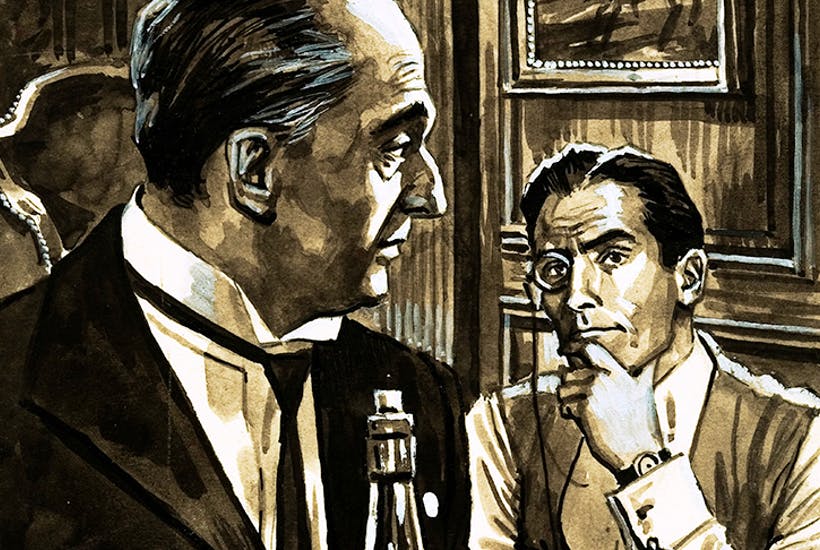Basil Ransome-Davies Though nobody was paying me to investigate the guy, I was intrigued enough to watch him on my own time. He kept some rough company but his boosting message of joy and redemption drew crowds like a dead cat draws flies.
That was funny, because he told stories that came out of left field and disappeared over the bleachers. One concerned a traveller along the nightmare alley between Jerusalem and Jericho. Sure enough, he was ambushed, robbed and left bleeding in the dirt. Then it was like New York, nobody cared. He became invisible, even to his own people.
So far, no surprises. Then the snap ending. What you might call an enemy alien, a Samaritan, stopped, cleaned him up and rescued him. When you picked the bones out of it it didn’t amount to much, but the way Jesus had people transfixed he could have been Houdini.Raymond Chandler’s ‘The Good Samaritan’
D.A. Prince No chap wants to wobble in, browsed and sluiced to the eyeballs, to find his door as tight as a cork and no one waiting to guide his tottering footsteps to the Land of Nod. What a fellow needs once he’s ploughed his homeward way and all that is a decentish sort, scoring high on the Jeeves scale, poised to fling wide the beaming portal and flourish the nibbles. One you can sit down with and share the comestibles. Worth his weight in whatnots and if you ever have the like you could do worse than wave a biscuit in his direction yourself. Bit of a night owl, keeping the thief from the door with one eye on the clock and a brace of Purdeys on the boil. If he starts lapping up the sauce himself all you need do is invite an aunt over. Or two. That never fails.
P.G. Wodehouse’s ‘The Faithful Servant’
Adrian Fry Be like Imogen of Kensington, Edith of Chelsea, Frances of Maida Vale, waiting return of their various metaphoric Lords who are attending weddings in social milieus quite beyond them. Wait, like them, in your flat. Dress neatly in Peter Pan-collared blouse and sensible skirt. Keep the lamps on despite the interminable silence of the solitary afternoon with its tendency to bring on alternating peaks of skittish excitement and yawning troughs of lassitude your Lord must never suspect. Check the drinks cabinet is amply stocked, eliminate the odour of cod fillet from the kitchenette. Do not be tempted, sensing cruelty in your predicament and wishing to visit it on others, to telephone contradictory instructions to your cleaning lady: forgiveness is unlikely to result. Let your readiness for his arrival be freshly minted every instant. Your reward? He will be generous, as the carelessly demanding often are.
Anita Brookner’s ‘The Faithful Servant’
Frank McDonald Far had he travelled with his father’s gold And some ungodly states and cities seen; In darkest dens and brothels he had been And witnessed things too wicked to behold. Reduced to destitution, tired and cold He longed to see his father’s pastures green; There would take on tasks however mean And beg forgiveness for his sins of old.
But when he heard his joyful father cry: ‘My son was dead, and now he lives again,’ With no reproach, no angry questions why, He wept aloud for causing so much pain. As they embraced, his brother stood nearby, Silent in pique, his irritation plain.
Keats’s ‘The Prodigal Son’
W.J. Webster Far from home a young man with cash will readily be led into temptation. New friends were only too glad to widen his knowledge of carnal sin. It was for him a time of animal bliss. But then his money and his friends ran out and he was constrained to return home and seek his family’s forgiveness. His father, who had advanced him the money for his travels, was overjoyed to have him back and laid on a great banquet of thanksgiving. Less happy was his elder brother. He had stayed on throughout, dutifully supporting their father’s work. But now the ember of resentment in his soul burst into flame. ‘Why,’ he demanded of his father, ‘do you celebrate this wastrel’s homecoming yet ignore my patient service?’
Everyone rejoices more,’ his father replied, ‘when something precious is lost then found again. God alone knows why.’
Graham Greene’s ‘The Prodigal Son’
Bill Greenwell A sheep is lost if not lost. If there are a hundred sheep they baa, why is one strayed and how soon will it return. Fleece which is not present cannot be counted, it is an absence, a corner of the heart. Any excuse for a special trip. In the morning after night there is finding, over the shoulders. Wool is not tasty, a dish of mutton more so. The shepherd hoists, the sheep takes a bow. Neighbours boo. A single sheep is found if lost, not lost if found, a reunion is a very strange colour, of redcurrant, sometimes of mint. An elation over the one, the ninety-nine left nibbling, after the searching, always not at all sadness. Rejoicing where no need, the not needed, not at all peculiar. Find a sinner and that, is not more a failure, a cheer a bumper a hula inside beside, all precisely.
Gertrude Stein/‘The Lost Sheep’
Your next challenge is to submit a poem (16 lines maximum) entitled ‘Breaking up is hard to do’. Please email entries to lucy@spectator.co.uk by midday on 30 January.





Comments